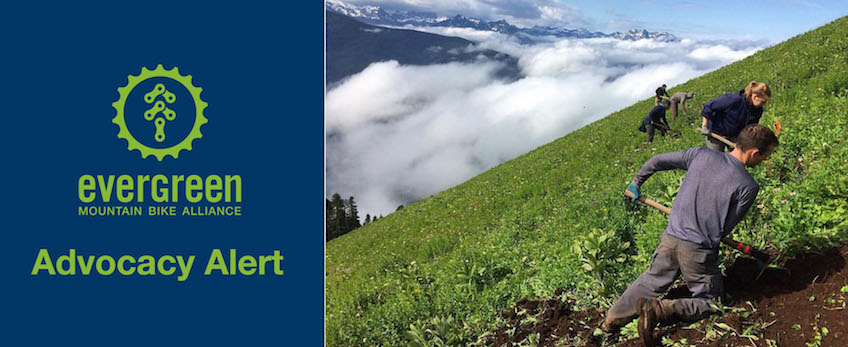Bikes in Wilderness – What Does it Mean for Washington MTB?
Wilderness Bill SB 3205 – Evergreen's Stance (and WHY)
Earlier this year, the Sustainable Trails Coalition launched an effort to update the Wilderness Act to allow mountain biking in both Congressionally designated and newly proposed wilderness areas. They have drafted Senate Bill 3205: Human-Powered Travel in Wilderness Areas Act Bill (SB 3205), which was recently introduced and co-sponsored by Utah Senators Mike Lee and Orrin Hatch.
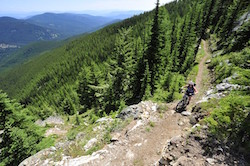 SB 3205 would allow mountain bike access in wilderness areas on a case-by-case basis. The New York Times released an article about the bill this week, and Pinkbike has released an informational three-part series (1, 2, & 3) about the Sustainable Trails Coalition’s efforts.
SB 3205 would allow mountain bike access in wilderness areas on a case-by-case basis. The New York Times released an article about the bill this week, and Pinkbike has released an informational three-part series (1, 2, & 3) about the Sustainable Trails Coalition’s efforts.
Evergreen Mountain Bike Alliance has been tracking SB 3205 closely and has communicated directly with the Sustainable Trails Coalition about the bill’s importance and relevance to Washington State. Wilderness issues are complex and can be polarizing, so we have been thorough and conscientious in our consideration of the bill.
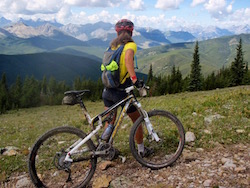 SB 3205’s proposed changes to the Wilderness Act would allow Evergreen to be a strong advocate for additional wilderness areas and partner with conservation groups to protect our wild areas through wilderness designation. The current absolute exclusion of mountain bikes in Congressionally designated Wilderness sometimes forces Evergreen to oppose new proposed wilderness areas in order to preserve trail access. This is not the position we want to be in.
SB 3205’s proposed changes to the Wilderness Act would allow Evergreen to be a strong advocate for additional wilderness areas and partner with conservation groups to protect our wild areas through wilderness designation. The current absolute exclusion of mountain bikes in Congressionally designated Wilderness sometimes forces Evergreen to oppose new proposed wilderness areas in order to preserve trail access. This is not the position we want to be in.
Recent new wilderness additions have closed many miles of trails to mountain bikers in Idaho (Boulder-White Clouds Wilderness) and Montana (Blue Joint and Sapphire Wilderness), and highlight the inherent tension that Evergreen and mountain bikers face when considering support for protection of pristine public lands. Too often, the cost is losing some of the nation’s most iconic mountain bike rides in areas that bring solitude and a connection to these wild places.
While the bill has potential to benefit the Evergreen community, we have serious concerns regarding the intent of the bill’s co-sponsors, who have a history of trying to remove lands from public ownership and supporting resource extraction. The text of the bill appears to be well-crafted and narrowly scoped in its current form, but we are mindful that the bill could be amended to weaken protection of public lands, prior to final passage.
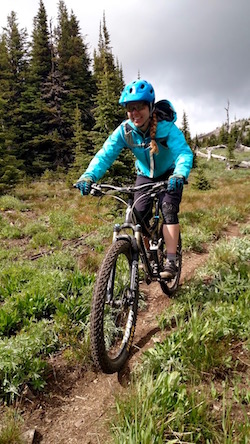 Evergreen’s excellent track record in WA State has led to very successful working relationships with wilderness, conservation, and other recreation user groups, as well as Federal land managers, to develop selective wilderness boundaries and/or alternative land protection designations that preserve mountain bike access.
Evergreen’s excellent track record in WA State has led to very successful working relationships with wilderness, conservation, and other recreation user groups, as well as Federal land managers, to develop selective wilderness boundaries and/or alternative land protection designations that preserve mountain bike access.
Examples of Evergreen’s collaborative work include shaping the Alpine Lakes Wilderness Addition boundaries to keep the Middle Fork Snoqualmie Trail open, and the Wild Olympics boundaries to keep the Dungeness and other trails open. In both cases, we were able to include these trails within Wild and Scenic River corridors, a protective land designation that allows mountain biking to continue. We hope to continue this success with the pending Colville National Forest Management Plan.
We are also currently working with our land management partners, including the Forest Service, to build 60+ new miles of quality mountain bike trails across the State. These successes are a direct result of our collaborative approach and our strong relationships with land managers, built over decades and rooted in trust.
As your Executive Director, my mission is to maintain access to trails and to continue to increase mountain bike trails and opportunities in Washington State. Mountain bikes do not degrade future wilderness quality, and should, at minimum, continue to be allowed in any new proposed wilderness areas until Congressionally designated as Wilderness. Maintaining existing mountain bike access, especially at popular, high usage trails in newly proposed wilderness should be the presumed path forward.
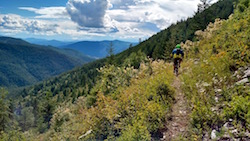 SB 3205, as written, has the potential to benefit mountain bikers in Washington. If, however, the bill were to be amended prior to final passage, it also has the potential to harm our relationships, our future trails, and undermine the public land ownership we rely on. Given the history of previous actions undertaken by some of the bill’s co-sponsors, and the current lack of bipartisan support, the possibility of amendments negatively impacting the bill is a real concern for us.
SB 3205, as written, has the potential to benefit mountain bikers in Washington. If, however, the bill were to be amended prior to final passage, it also has the potential to harm our relationships, our future trails, and undermine the public land ownership we rely on. Given the history of previous actions undertaken by some of the bill’s co-sponsors, and the current lack of bipartisan support, the possibility of amendments negatively impacting the bill is a real concern for us.
Evergreen cares deeply about this issue and we will continue to closely monitor the bill’s progress through the legislative process. We commend the Sustainable Trails Coalition for its efforts and are fully aware that the wilderness designation issue can be very contentious, and that it is currently of great significance in other states. If it becomes clear that the bill in its final form aligns with Evergreen’s mission and has a strong probability of passing with bi-partisan support, we will notify our community and members of our support at that time.
Until then, Evergreen will continue to work collaboratively to maintain mountain bike access to our exceptional landscapes in Washington, and to selectively support new wilderness proposals when this can be done with minimal to no loss of trails.
Sincerely,
Yvonne Kraus, Executive Director

